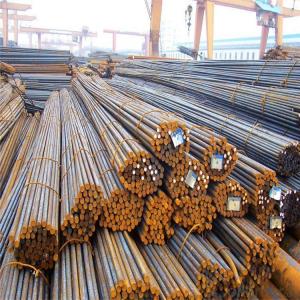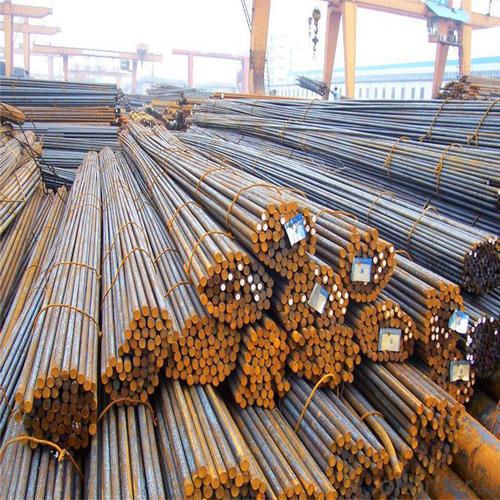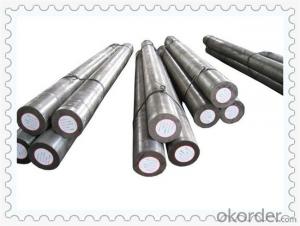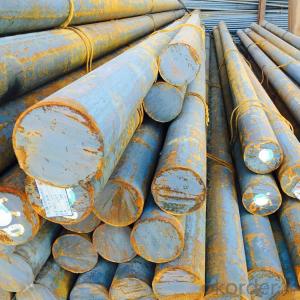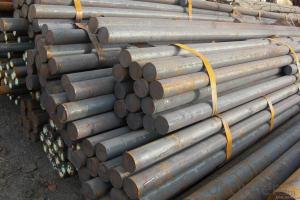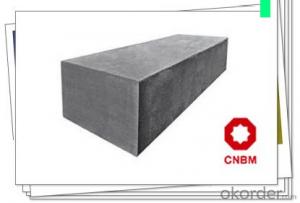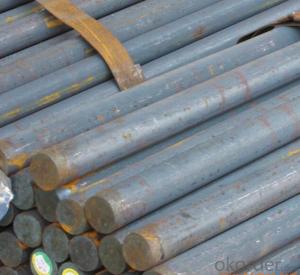Carbon Structure Steel 1040 S40C
- Loading Port:
- Tianjin
- Payment Terms:
- TT OR LC
- Min Order Qty:
- 100 m.t.
- Supply Capability:
- 500000 m.t./month
OKorder Service Pledge
OKorder Financial Service
You Might Also Like
Specification
Carbon Structure Steel 1040 S40C
Product Description of Carbon Structure Steel 1040 S40C
1. Steel grade: SAE1040, 40#, C40, S40C
2. Length: 6M-12M
3. Diameter: 16mm-300mm
4. Product range: round bar, flat bar, square bar
5. Technique: Hot rolled, forged, cold drawn
Specification of Carbon Structure Steel 1040 S40C
Material | S40C | Round bar | Dia(mm) | 16-300mm |
Process | EAF + LF + VD + Forged + Heat Treatment (optional) | Length (mm) | Max 12m | |
Heat treatment | Normalized / Annealed / Quenched / tempered | Flat bar | Thickness(mm) | 8-500mm |
Delivery condition | Hot forged +Rough machined (black surface after Q/T)+ Turned (optional) | Width(mm) | 70-200mm | |
Test | Ultrasonic test according to SEP 1921-84 D/d | Length (mm) | Max 12m |
Chemical Composition of Carbon Structure Steel 1040 S40C
C | Si | Mn | Cr | Ni | Cu |
0.37~0.43 | 0.17~0.37 | 0.35~0.65 | ≤0.25 | ≤0.30 | ≤0.25 |
Photo Show of Hot Rolled Steel Round Bar S20C
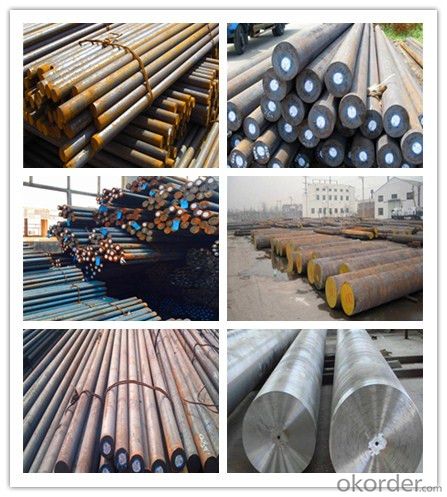
Packing and Delivery:
Packing in bundle package, or as customer's requirements.
Delivery Detail: 45 days after receiving the deposit.
Usage and Applications of Carbon Structure Steel 1040 S40C
1. Steel round bar is used in a large number of architectural and engineering structures. Or it can be used in construction of plants for the production of steel house frames, high-voltage transmission towers, bridges, vehicles, boilers, containers, ships, etc.
2. And we can use this kind of product on the performance of the mechanical parts if the demand is not very high.
3. Some special material steel round bar can be used for main shaft of steamer, hummer shank, with big section and supper force.
Company Information
CNBM International Corporation is the most important trading platform of CNBM group.
Whith its advantages, CNBM International are mainly concentrate on Cement, Glass, Iron and Steel, Ceramics industries and devotes herself for supplying high qulity series of refractories as well as technical consultancies and logistics solutions.


F A Q
1, Your advantages?
professional products inquiry, products knowledge train (for agents), smooth goods delivery, excellent customer solution proposale
2, Test & Certificate?
SGS test is available, customer inspection before shipping is welcome, third party inspection is no problem
3, Factory or Trading Company?
CNBM is a trading company but we have so many protocol factories and CNBM works as a trading department of these factories. Also CNBM is the holding company of many factories.
4, Payment Terms?
30% TT as deposit and 70% before delivery.
Irrevocable L/C at sight.
5, Trading Terms?
EXW, FOB, CIF, FFR, CNF
6, After-sale Service?
CNBM provides the services and support you need for every step of our cooperation. We're the business partner you can trust.
For any problem, please kindly contact us at any your convenient time.
We'll reply you in our first priority within 24 hours.
- Q: How do you calculate the weight of a steel round bar based on its length and volume?
- To calculate the weight of a steel round bar based on its length and volume, you would need to know the density of steel, which is approximately 7.85 grams per cubic centimeter. First, calculate the volume of the round bar using the formula for the volume of a cylinder (pi * radius squared * length). Then, multiply the volume by the density to obtain the weight of the steel round bar.
- Q: Can steel round bars be hardened through heat treatment?
- Yes, steel round bars can be hardened through heat treatment. Heat treatment is a process that involves heating the steel to a specific temperature and then rapidly cooling it to achieve the desired hardness and strength. There are different heat treatment methods, such as quenching and tempering, which can be used to harden steel round bars. Quenching involves heating the steel to a critical temperature and then rapidly cooling it in a liquid medium, such as oil or water, to achieve maximum hardness. Tempering, on the other hand, involves reheating the quenched steel to a lower temperature to reduce brittleness and improve toughness while maintaining a desirable hardness level. Heat treatment can significantly improve the mechanical properties of steel round bars, making them suitable for various applications that require high strength and hardness.
- Q: Can steel round bars be used for making steering linkages?
- Yes, steel round bars can be used for making steering linkages. Steel round bars are commonly used in various applications, including automotive and mechanical engineering, due to their high strength, durability, and resistance to wear and tear. Steering linkages are critical components in a vehicle's steering system, responsible for transmitting steering input from the steering wheel to the wheels. The use of steel round bars provides the necessary strength and rigidity required to ensure efficient and reliable steering performance. However, it is important to consider other factors such as the specific design requirements, weight considerations, and the desired level of flexibility or torsional properties when selecting the appropriate type and size of steel round bar for steering linkages.
- Q: How do you calculate the fatigue strength of a steel round bar?
- The fatigue strength of a steel round bar can be calculated using various methods, such as the stress-life (S-N) curve approach or the strain-life (ε-N) curve approach. 1. Stress-Life (S-N) Curve Approach: This method involves plotting the stress amplitude (S) against the number of cycles to failure (N) on a log-log scale. The S-N curve is obtained by subjecting multiple specimens of the steel round bar to different stress levels and measuring the number of cycles to failure for each stress level. The fatigue strength of the steel round bar can be determined by identifying the stress level at which the desired number of cycles to failure is achieved, typically referred to as the endurance limit. 2. Strain-Life (ε-N) Curve Approach: This method involves plotting the strain amplitude (ε) against the number of cycles to failure (N) on a log-log scale. Similar to the S-N curve approach, multiple specimens of the steel round bar are subjected to different strain levels, and the number of cycles to failure is measured. The strain-life curve can then be used to determine the fatigue strength by identifying the strain level corresponding to the desired number of cycles to failure. It is important to note that calculating the fatigue strength of a steel round bar requires conducting fatigue tests on representative specimens under controlled conditions. These tests involve subjecting the specimens to cyclic loading, typically in the form of tension-compression cycles, and recording the number of cycles to failure. The obtained data is then used to construct the S-N curve or the ε-N curve, which provides valuable information about the fatigue behavior and strength of the steel round bar.
- Q: What is the typical yield strength of a steel round bar?
- The typical yield strength of a steel round bar can vary depending on the specific grade and manufacturing process, but it is commonly in the range of 300 to 700 megapascals (MPa).
- Q: Can steel round bars be used for making fasteners or bolts?
- Certainly! The utilization of steel round bars is viable for the production of fasteners and bolts. Steel is widely employed as a material for these components due to its exceptional robustness, longevity, and resistance against corrosion. The round bars, crafted from steel, can be effortlessly manipulated and threaded, enabling the creation of an array of fasteners and bolts such as screws, nuts, and threaded rods. The selection of the precise steel grade hinges upon the specific application and desired strength properties. Nevertheless, it is imperative to bear in mind that the manufacturing process and stringent quality control are paramount in guaranteeing the dependability and performance of the end product.
- Q: What is the difference between a solid and a hollow steel round bar?
- A solid steel round bar is a cylindrical bar made entirely of solid steel material, meaning it is filled and does not have any hollow spaces inside. On the other hand, a hollow steel round bar is also cylindrical in shape but has a hollow center, meaning it has empty space or a void inside the bar. The main difference between a solid and a hollow steel round bar lies in their structural composition and the purposes they serve. A solid steel round bar is typically used in applications where strength and durability are of utmost importance. It is commonly used in construction, manufacturing, and engineering projects where load-bearing capacity is required. On the other hand, a hollow steel round bar is designed to be lighter in weight while still maintaining structural integrity. The hollow center allows for weight reduction while still providing sufficient strength for various applications. Hollow steel round bars are often used in industries such as aerospace, automotive, and marine, where weight reduction is critical for improved fuel efficiency and overall performance. Additionally, the hollow space inside a hollow steel round bar also provides an opportunity for customization. It can be used to house other components, such as wires or piping, allowing for a more streamlined and efficient design. This makes hollow steel round bars versatile and suitable for various applications that require both strength and weight reduction. In summary, the main difference between a solid and a hollow steel round bar lies in their structural composition and the purposes they serve. Solid steel round bars are used for applications that require maximum strength and durability, while hollow steel round bars offer weight reduction and customization options, making them suitable for applications that prioritize lightweight design without compromising structural integrity.
- Q: What is the difference between carbon steel and stainless steel round bars?
- Carbon steel and stainless steel round bars differ primarily in their composition and properties. Carbon steel is primarily made up of iron and carbon, with trace amounts of other elements. It is known for its strength and durability, making it ideal for various applications in industries such as construction and automotive. Carbon steel round bars are generally more affordable than stainless steel round bars. Stainless steel, on the other hand, is a steel alloy that contains at least 10.5% chromium. This addition of chromium gives stainless steel its unique properties, including corrosion resistance. Stainless steel round bars are highly resistant to rust and staining, making them suitable for applications in environments exposed to moisture and chemicals. They are commonly used in industries such as food processing, medical equipment, and marine applications. Due to the chromium content, stainless steel round bars are generally more expensive than carbon steel round bars. However, the added cost is justified by their superior corrosion resistance and aesthetic appeal. Stainless steel also offers different grades and finishes, allowing for customization based on specific requirements. In summary, the main difference between carbon steel and stainless steel round bars lies in their composition and properties. Carbon steel is strong and affordable, while stainless steel offers corrosion resistance and comes in various grades and finishes. The choice between the two depends on the specific application and the desired properties required for the project.
- Q: Can steel round bars be used for making gears or sprockets?
- Gears or sprockets can indeed be made using steel round bars. Steel is widely employed in the manufacturing of gears and sprockets due to its exceptional strength, durability, and resistance to wear and tear. Steel round bars can be shaped through machining or forging and then further modified by cutting, drilling, or milling to create the necessary teeth or grooves for gear or sprocket functionality. The selection of the specific type of steel and its heat treatment can be based on the application requirements, such as load capacity, speed, and environmental conditions. All in all, steel round bars offer a versatile and dependable option for the production of gears and sprockets.
- Q: What is the maximum length available for steel round bars?
- The maximum length available for steel round bars can vary depending on the supplier and the specific requirements, but typically it can range from 12 to 24 feet.
Send your message to us
Carbon Structure Steel 1040 S40C
- Loading Port:
- Tianjin
- Payment Terms:
- TT OR LC
- Min Order Qty:
- 100 m.t.
- Supply Capability:
- 500000 m.t./month
OKorder Service Pledge
OKorder Financial Service
Similar products
Hot products
Hot Searches
Related keywords
